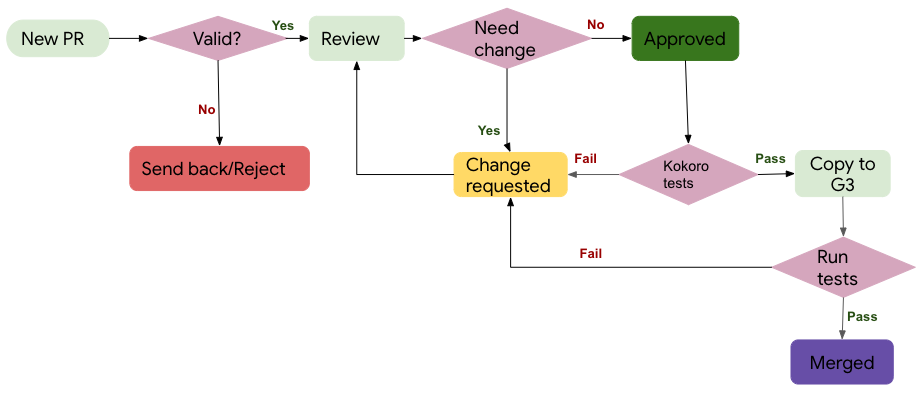- Sort Score
- Result 10 results
- Languages All
Results 181 - 190 of 326 for own (0.96 sec)
-
docs/en/docs/tutorial/metadata.md
| `description` | `str` | A short description of the API. It can use Markdown. | | `version` | `string` | The version of the API. This is the version of your own application, not of OpenAPI. For example `2.5.0`. | | `terms_of_service` | `str` | A URL to the Terms of Service for the API. If provided, this has to be a URL. |
Registered: Sun Sep 07 07:19:17 UTC 2025 - Last Modified: Sun Aug 31 09:15:41 UTC 2025 - 5.9K bytes - Viewed (0) -
CONTRIBUTING.md
- Changes are consistent with the [Coding Style](#c-coding-style). - Run the [unit tests](#running-unit-tests). ## How to become a contributor and submit your own code  ### Typical Pull Request Workflow - **1. New PR**
Registered: Tue Sep 09 12:39:10 UTC 2025 - Last Modified: Sat Jan 11 04:47:59 UTC 2025 - 15.9K bytes - Viewed (0) -
src/main/java/jcifs/smb/SmbException.java
import java.util.Map; import jcifs.CIFSException; import jcifs.util.Hexdump; /** * There are hundreds of error codes that may be returned by a CIFS * server. Rather than represent each with it's own <code>Exception</code> * class, this class represents all of them. For many of the popular * error codes, constants and text messages like "The device is not ready" * are provided. * <p>
Registered: Sun Sep 07 00:10:21 UTC 2025 - Last Modified: Sat Aug 16 01:32:48 UTC 2025 - 6.7K bytes - Viewed (0) -
.github/ISSUE_TEMPLATE/feature_addition_request.yaml
or even industries — utilities useful for a sizable proportion of all Java programmers everywhere. If you can give enough detail such that any of us can imagine coming across a similar need in our own work, that's extremely helpful in studying how broadly useful the feature will be. - type: textarea attributes: label: Concrete Use Cases
Registered: Fri Sep 05 12:43:10 UTC 2025 - Last Modified: Fri Nov 17 18:47:47 UTC 2023 - 5.8K bytes - Viewed (0) -
okhttp-tls/src/main/kotlin/okhttp3/tls/HandshakeCertificates.kt
* * ### Server Authentication * * This is the most common form of TLS authentication: clients verify that servers are trusted and * that they own the hostnames that they represent. Server authentication is required. * * To perform server authentication: * * * The server's handshake certificates must have a [held certificate][HeldCertificate] (a
Registered: Fri Sep 05 11:42:10 UTC 2025 - Last Modified: Sat May 10 11:15:14 UTC 2025 - 8.4K bytes - Viewed (0) -
docs/changelogs/changelog_4x.md
available in those versions! ## Version 4.8.0 _2020-07-11_ * New: Change `HeldCertificate.Builder` to use its own ASN.1 certificate encoder. This is part of our effort to remove the okhttp-tls module's dependency on Bouncy Castle. We think Bouncy Castle is great! But it's a large dependency (6.5 MiB) and its security provider featureRegistered: Fri Sep 05 11:42:10 UTC 2025 - Last Modified: Wed Apr 17 13:25:31 UTC 2024 - 25.2K bytes - Viewed (0) -
docs/recipes.md
`MultipartBody.Builder` can build sophisticated request bodies compatible with HTML file upload forms. Each part of a multipart request body is itself a request body, and can define its own headers. If present, these headers should describe the part body, such as its `Content-Disposition`. The `Content-Length` and `Content-Type` headers are added automatically if they're available. === ":material-language-kotlin: Kotlin"
Registered: Fri Sep 05 11:42:10 UTC 2025 - Last Modified: Sat Aug 30 17:01:12 UTC 2025 - 47.8K bytes - Viewed (0) -
helm-releases/minio-2.0.1.tgz
providing it to Helm via the `trustedCertsSecret` value. If `.Values.tls.enabled` is `true` and you're installing certificates for third party CAs, remember to include Minio's own certificate with key `public.crt`, if it also needs to be trusted. For instance, given that TLS is enabled and you need to add trust for Minio's own CA and for the CA of a Keycloak server, a Kubernetes secret can be created from the certificate files using `kubectl`: ``` kubectl -n minio create secret generic minio-trusted-certs...
Registered: Sun Sep 07 19:28:11 UTC 2025 - Last Modified: Tue Aug 31 09:09:09 UTC 2021 - 13.6K bytes - Viewed (0) -
cmd/warm-backend-gcs.go
if object != "" { err = ObjectNotFound{ Bucket: bucket, Object: object, } break } err = BucketNotFound{Bucket: bucket} case "conflict": if message == "You already own this bucket. Please select another name." { err = BucketAlreadyOwnedByYou{Bucket: bucket} break } if message == "Sorry, that name is not available. Please try a different one." {Registered: Sun Sep 07 19:28:11 UTC 2025 - Last Modified: Sun Mar 30 00:56:02 UTC 2025 - 6.1K bytes - Viewed (0) -
compat/maven-artifact/src/main/java/org/apache/maven/artifact/resolver/AbstractArtifactResolutionException.java
Registered: Sun Sep 07 03:35:12 UTC 2025 - Last Modified: Tue Apr 01 21:22:14 UTC 2025 - 10.1K bytes - Viewed (0)